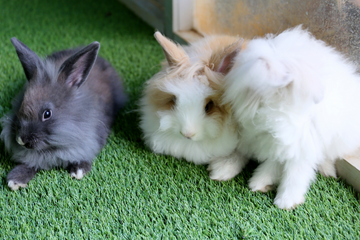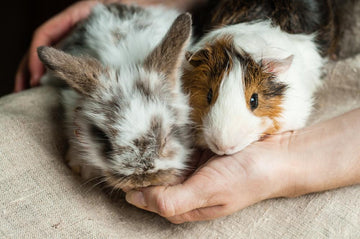Top Allergy-Friendly Small Pets to Consider
Do allergies make you hesitate about owning a pet? You're not alone. Allergies can make pet ownership feel like a challenge, especially if you're dreaming of a furry companion. The good news is that some small pets are better suited for people with allergies than others. By choosing carefully and keeping their environment clean, you can still enjoy life with a pet.
Click Here to Shop Rabbit Products.

In this guide, we'll cover the best allergy-friendly small pets, including specific breeds of rabbits. We'll also share tips to reduce allergic reactions so you can confidently welcome a new pet into your home.
What Does Allergy-Friendly Mean?
The term "allergy-friendly" doesn't mean hypoallergenic. No animal is entirely free of allergens. Most allergies are caused by proteins in dander (dead skin cells), saliva, or urine—not the pet's fur. However, animals that shed less fur or produce minimal dander are often easier for allergy sufferers to manage.
Choosing a pet with these traits, combined with proper care, can reduce allergic reactions significantly. The best part? There are plenty of allergy-friendly small pets to choose from.
Allergy-Friendly Small Pets

Small pets are an excellent option if you or someone in your home has allergies. Many small animals produce less dander or none at all. Here are some great choices:
-
Guinea Pigs: These gentle pets shed less than larger furry animals. Their short-haired breeds, like the American guinea pig, are especially easy to manage. Regular cage cleaning is key to reducing allergens.
-
Hamsters: Hamsters are tiny, independent, and produce very little dander. Their compact size also makes it easier to keep their living space clean and allergen-free.
-
Gerbils: Gerbils are curious, active, and shed very little. They're low-maintenance pets that thrive in a clean environment, making them a good choice for people with mild allergies.
-
Hedgehogs: These unique animals have spines instead of fur, which means they shed very little. Hedgehogs are quiet and low-maintenance, making them ideal for allergy sufferers.
-
Rats: Rats are clean, social animals with short hair and low dander production. They bond well with their owners and are surprisingly allergy-friendly.
-
Fish: Fish are the perfect pet for allergy sufferers. Since they don't have fur or dander, they're completely allergy-free. Plus, a fish tank can bring a soothing atmosphere to your home.
-
Reptiles: Reptiles like turtles, lizards, and snakes don't have fur or dander either. They require specific care and habitats but can be excellent options for allergy-sensitive households.
The Best Rabbits for People with Allergies
If you're a rabbit lover, some breeds may work better for you than others. While no rabbit is hypoallergenic, certain breeds shed less or have fur that's easier to manage. Here are some of the best options:
-
Rex Rabbit: With its short, velvety fur, the Rex rabbit sheds less than other breeds. This makes it easier to keep their environment clean.
-
American Sable: This breed has a soft, dense coat that doesn't shed as much as long-haired rabbits. Regular grooming helps reduce allergens further.
-
Havana Rabbit: These rabbits have sleek, shiny fur that doesn't shed much. They're also known for being calm and affectionate, making them great companions.
If you have allergies but still want a rabbit, consider a few breeds before adopting. Many breeders and shelters allow potential adopters to interact with rabbits, making it easier to see how you respond. Rabbits can be one of the most rewarding allergy-friendly small pets for those willing to put in the care.

How to Manage Pet Allergies
Some allergic reactions might still occur Even if you choose an allergy-friendly small pet. The following tips can help minimize your symptoms:
-
See an allergist: If you suspect you're allergic to your pet, consult a doctor. They can confirm the cause of your symptoms and recommend medications or treatments, such as antihistamines or immunotherapy.
-
Keep pet-free zones: Designate areas like your bedroom as pet-free to reduce allergen exposure. This gives you a place to breathe easy and sleep soundly.
-
Use an air purifier: High-quality air purifiers can trap pet dander, helping to improve indoor air quality. Look for filters designed specifically for allergens.
-
Clean often: Vacuum carpets and furniture frequently, wash your pet's bedding, and clean their cage or tank regularly. These steps can significantly reduce allergens in your home.
-
Practice good hygiene: Wash your hands after handling your pet, and avoid touching your face. This simple habit can prevent allergens from spreading.
Why Allergy-Friendly Pets Are a Great Option
Owning a pet can be a rewarding experience, and allergies don't have to get in the way. With careful planning and proper care, even allergy sufferers can enjoy the companionship of a pet. Small animals like hamsters, guinea pigs, and fish are excellent options, as are certain rabbit breeds with minimal shedding.
Before adopting a pet, spend time with the species or breed you're considering. This helps you assess how your body reacts. If you're adopting a rabbit, check out this helpful guide to getting started.
Conclusion: Welcoming an Allergy-Friendly Small Pet
Allergies don't have to prevent you from experiencing the joy of pet ownership. By choosing an allergy-friendly small pet and following simple strategies to manage allergens, you can create a happy, healthy home for you and your new companion.

Fun and Unique Names for Rabbits

Healthy Rabbit Treats for Hoppy Pets





![RHDV2 Critical Information + Frequently Asked Questions [Updated 03/20/2025]](http://www.rabbitholehay.com/cdn/shop/articles/rhdv2-critical-information-frequently-asked-questions-V1.png?v=1742490107&width=360)

